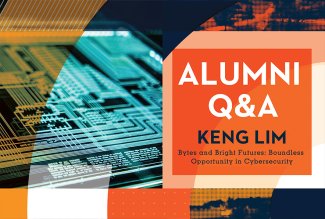
College-bound students with a knack for computer technology should consider obtaining an education that prepares them for a career in cybersecurity.
Cybersecurity is one of the fastest growing fields in the nation. The U.S. Department of Labor Statistics predicts the need for information security analysts will grow by 32 percent by 2032. Cybercrime Magazine projects 3.5 million job openings in the cybersecurity field by 2025.
At ∫˘¬´”∞“µ, students can major in computer engineering, computer science, or electrical engineering. All three majors offer a cybersecurity concentration and are housed in ∫˘¬´”∞“µ‚Äôs T.J. Smull College of Engineering, ranked as one of the top 25 undergraduate engineering colleges without a Ph.D. in the country by U.S. News and World Report.
Small class sizes, personal attention from professors, and amazing internships are just a few of the program’s pluses. Students also learn in a state-of-the-art facility designed to spark innovation and collaboration.
 ∫˘¬´”∞“µ alumnus Keng-Siang Lim, BSCE ‚Äô89, founder and CEO of NextLabs, Inc. in San Mateo, Calif., says ∫˘¬´”∞“µ set him up to become a leading cybersecurity entrepreneur by developing his critical thinking skills and giving him experience working on interdisciplinary teams.
∫˘¬´”∞“µ alumnus Keng-Siang Lim, BSCE ‚Äô89, founder and CEO of NextLabs, Inc. in San Mateo, Calif., says ∫˘¬´”∞“µ set him up to become a leading cybersecurity entrepreneur by developing his critical thinking skills and giving him experience working on interdisciplinary teams.
‚ÄúI developed a thirst for knowledge and a drive to improve. I learned how to be results-oriented,‚Äù he said. ‚ÄúAt ∫˘¬´”∞“µ, I also became a global citizen, heavily influenced by the inclusive culture and kindness of people on campus.‚Äù Keng went on to obtain a master‚Äôs degree from MIT before founding and leading several companies.
NextLabs, Inc., his current company, is a top cybersecurity firm providing zero trust data-centric security software to protect business-critical data and applications for global companies and government agencies such as Boeing, GE, Caterpillar, DuPont, Roche, AXA, and U.S. Department of Defense.
In a Q&A, Keng offers his insights into the cybersecurity field for young adults considering this career avenue.
Q: Why should a young adult interested in engineering consider cybersecurity?
A: Cybersecurity is a good fit for a budding engineer because problem solving and analytical skill is essential to excel in this field. There are also a variety of specializations, allowing engineers to choose an area that aligns with their interests. Because it’s a growing field with a shortage of skilled professionals, expect competitive pay and job security.
Q: What do you like the most about working in cybersecurity?
A: Cybersecurity challenges require creative and technologically-advanced solutions, and I enjoy solving these complex problems. It’s a constantly evolving field, so there is always something new to learn and discover. Additionally, it requires collaboration and cross-functional teamwork to be successful. Because of these aspects, cybersecurity companies have innovative cultures that foster creativity and encourage out-of-the-box thinking.
Most importantly, working in cybersecurity means the chance to make a positive impact. By preventing cyberattacks, cybersecurity professionals help protect individuals and organizations from harm. The field truly has a global significance.
Q: What exciting opportunities are out there?
A: There are so many, I am going to list them with a brief explanation:
- Security software development: develop new algorithms, new technologies, and innovative solutions to protect systems and data from cyber threats; create more secure authentication and authorization methods; develop new approaches for detecting and mitigating attacks; and keep pace with the constantly evolving threat landscape.
- Cloud security: securing cloud computing infrastructure and data.
- Artificial intelligence and machine learning: developing and applying AI and ML solutions for cybersecurity.
- Digital forensics: analyzing digital evidence to support investigations.
- Threat intelligence: gathering, analyzing and utilizing information about current and emerging cyber threats.
- Blockchain security: securing decentralized systems based on blockchain technology.
- Security research: conducting research and development in cybersecurity.
- Penetration testing: testing and evaluating an organization’s security posture by attempting to penetrate its systems.
- Incident response: reporting to and managing the aftermath of a security breach.
- ICS/SCADA security: securing industrial control systems and supervisory control and data acquisition systems.
- Compliance and regulation: ensuring organizations comply with security regulations and standards.
Q: In your opinion, why should a young adult considering the cybersecurity field enroll at ∫˘¬´”∞“µ‚Äôs T.J. Smull College of Engineering?
A: For several reasons. First, you‚Äôll find a focus on practical, hands-on learning through project-based courses and research. Small class sizes allow for close interaction between students and faculty. The friendly environment and highly collaborative culture create a great atmosphere for learning. And, there is a strong emphasis on entrepreneurial, ethical, and professional development. Finally, the College of Engineering collaborates with industries and businesses through internships, co-ops, and sponsored project. At my company, for example, we offer a remote internship opportunity for ∫˘¬´”∞“µ students.
To learn more about the T.J. Smull College of Engineering and opportunities in cybersecurity, visit: /college-engineering.